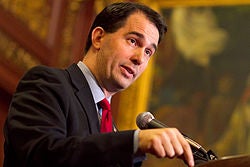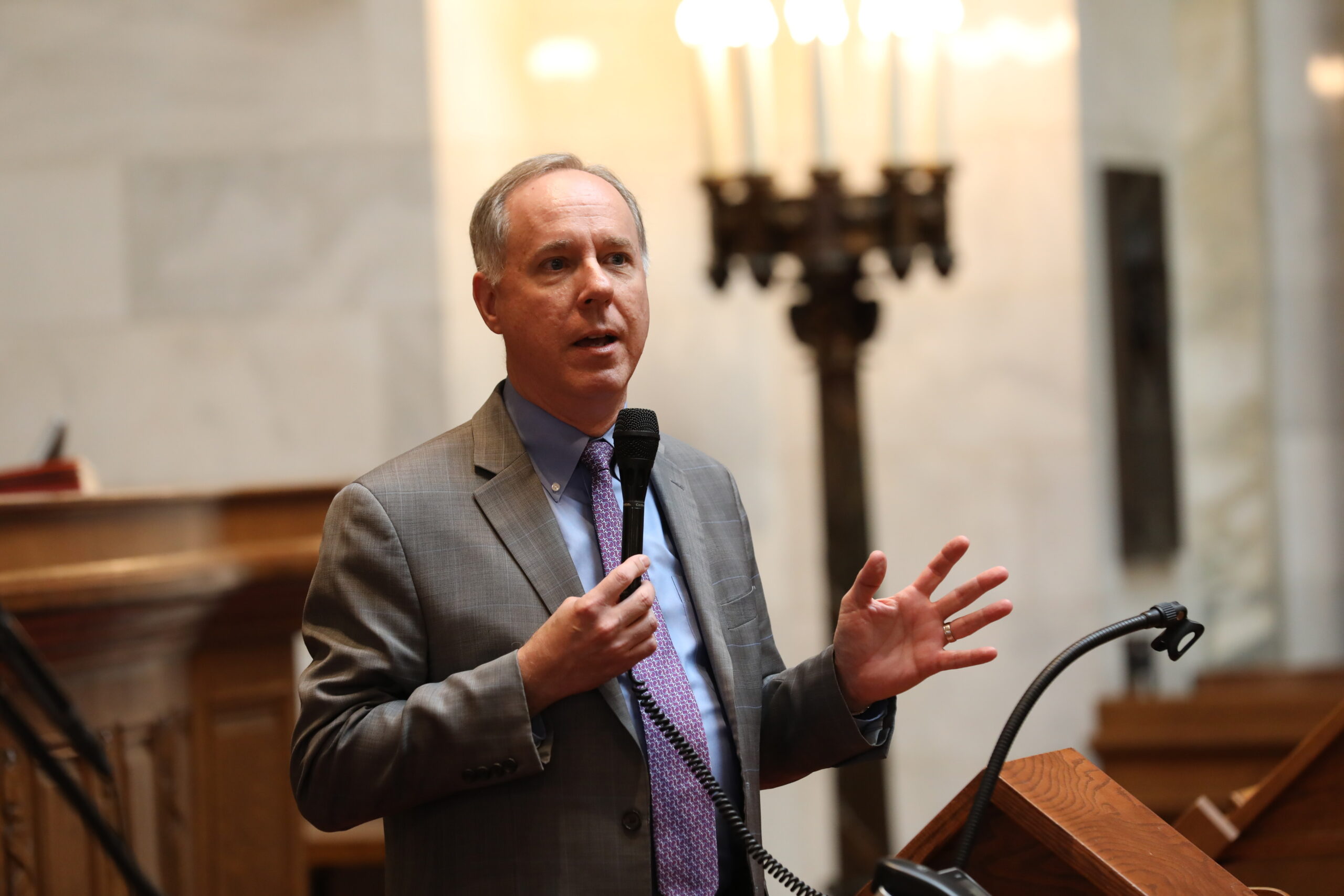Governor Scott Walker unveiled a budget yesterday that his office says would cut income taxes by roughly a couple dollars a week for the average person. It would also hold state aid to public schools mostly flat and revive a structural deficit that his previous budget had eliminated. The Governor called it a budget of independence from government, while his critics called it a case of misplaced priorities.
Walker’s two-year budget includes a $343 million income tax cut. His office says the cut would go to everyone who pays taxes, with a focus on incomes up to $215,000 for married couples. The cut would be permanent and Walker said it would not be his last.
“Our middle class tax cut is a down payment on my goal of reducing the tax burden in our state every year I’m in office. I want to cut taxes over and over and over again until we’re leading the country in economic recovery.”
Stay informed on the latest news
Sign up for WPR’s email newsletter.
Walker’s budget would increase transportation funding, but it would not implement any of the ideas from a special study commission on road funding to get there.
“Higher taxes would slow our improving economy. With this in mind, this budget does not, I repeat, does not include a gas tax increase or a vehicle registration fee bump.”
Instead, Walker’s budget increases borrowing by about $400 million and would pay off those bonds by selling state property, like power plants. His budget would also transfer more money into the roads fund out of the state’s general fund, which pays for schools and health care.
Walker’s schools budget got some of the biggest applause from Republican lawmakers, especially its focus on expanding voucher schools.
“Now, while we work to improve under-performing schools, our children can’t afford to wait. This is why we provide new choices for parents in areas where students are failing to meet expectations.”
Walker’s budget would let vouchers expand beyond Milwaukee and Racine to nine other cities. His budget includes a far greater funding increase per student in voucher schools that it does for public schools.
Walker also reiterated his plans to retool BadgerCare so the Medicaid program provides health care only to people below the poverty line. He said the budget as a whole was focused on freedom.
“There’s a reason we celebrate the 4th of July instead of April 15th. It’s because we celebrate our independence as free men and women and not our dependence on the government. Our reforms move people to true independence. This is the American dream. And our budget shows it is alive and well in the state of Wisconsin.”
The budget was not limited to fiscal items alone. For example, it would make it easier for the Rent to Own industry to operate in Wisconsin.
Senate Democratic Minority Leader Chris Larson said Walker’s budget amounted to a trade off between a tax cut of a couple dollars a week and public school funding.
“Most people, given the choice of ‘do you want to get a cup of coffee, or do you want to fund your kid’s education and make sure that they have access to a bright future?’: I think most people are going to choose their kids.”
Teachers and administrators from public high schools, middle schools and elementary schools roundly panned the budget. Beloit Superintendent Steve McNeal said his district already dealt with record cuts in the last budget.
“We’ve pulled every rabbit out of the hat. And we know that even though we lost 40-50 staff members in the last two years or staff positions that sustaining another huge cut like this one would be a tremendous blow to our educational system.”
Reaction was different in the world of higher ed, where Walker would grow the University of Wisconsin budget by $181 million. UW Madison Interim Chancellor David Ward said, “This is the best budget we have seen in many cycles.”
GOP leaders praised the Governor’s budget, even though by the administration’s own numbers it would revive the structural deficit Republicans were so proud to have eliminated. It would grow to $188 million, but Assembly Speaker Robin Vos downplayed that number.
“We have shown that we can balance a budget with billions of dollars in deficits. Hundreds of millions that are projected two years out? Too early to tell.”
But the picture is more complicated in the Senate, where Republicans like Luther Olsen of Ripon are uneasy with what this budget would do with schools. “Let’s just say we’ve got a lot of work to do.”
Olsen is one of 16 lawmakers on the legislature’s Joint Finance Committee, which is where this budget heads next.
Wisconsin Public Radio, © Copyright 2024, Board of Regents of the University of Wisconsin System and Wisconsin Educational Communications Board.






